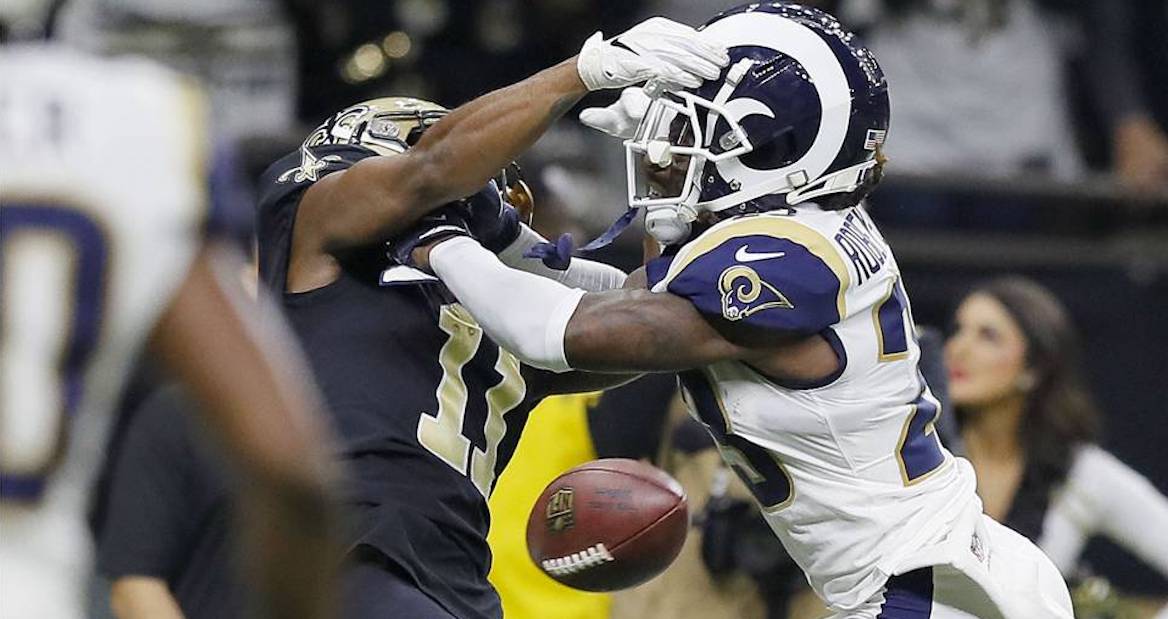
Championship Round: Can the NFL’s Officiating Crisis Be Fixed?
The NFL’s Championship Round with marked with thrilling chess matches, star players stepping up and Tony Romo officially establishing himself as the analyst in football. Unfortunately Sunday will be far more remembered for Bill Vinovich’s crew derailing the Saints season by missing pass interference on Rams corner Nickell Robey-Coleman so obvious that the league immediately admitted the error to a distraught Sean Payton once the game ended. Robey-Coleman knew it, too. “Hell yeah, that was P.I.,” he told reporters. Had officials made the call, the Saints could have let the clock wind down and kicked a chip shot to win the game. Instead the Rams had more than enough time to tie; they eventually won 26-23 in overtime.
That whole period was not Payton’s finest hour as a playcaller and the Rams truly stepped up but to have a missed call so egregious is, as Payton said, something they’ll “probably never get over.” The course of football history – including Drew Brees’s legacy – was forever altered on one missed call. Of course this is hardly the first time officials have affected the outcome of a game in controversial fashion. (Almost every franchise has an example). Nor was it the only missed call in the Rams-Saints game. Or of Championship Sunday. The Patriots’ offense avoided a crucial 3rd and 7 late when Chris Jones earned a roughing the passer call for tapping Tom Brady’s shoulder. An earlier play that was not called actually showed Patrick Mahomes being roughed up by a defender.
Every year feels like the worst year yet in officiating, and this season was no different, especially with wildly inconsistent enforcement of the new roughing the passer rule. Before we concoct any solutions to ongoing issues, we need to acknowledge the underlying issue. Football is played at a far faster pace than it appears on the screen. Plays are more often than not bang-bang, and it’s scientifically impossible for an official to get it right 100% of the time, or even 85%. Even the best officials will miss the intricacies of a play, thus potentially costing a team a game or a season. We should not accept the inherent flaw of human error without action.
Officiating needs an overhaul. The league’s competition committee inches toward more fairness – i.e. relaxing the catch rule, makes scoring plays and turnovers reviewable – it’s seemingly never enough. It’s like saying all of your car is covered by insurance except the engine.
I’m not sure there is any obvious solution until we humans mostly evaporate and the world is run on artificial intelligence. But we need the league to further its conversation because the status quo is unacceptable. For an organization and fan base like New Orleans (or any fan base) to invest so much time and emotional energy into supporting a football game, only to have the season stripped away by a horrific no-call is just abhorrent. What happened Sunday will leave a tarnish on the NFL for a long time.
Here are a few ideas for improvement, though admittedly they all have flaws..
– Make PI reviewable. This one is the most clear-cut and fair. The CFL made pass interference reviewable and, as ESPN’s Kevin Seifert writes, this rule allowed a no call to be overturned in the 2015 Grey Cup that would have adversely impacted the outcome of the game. After Sunday’s debacle the league was to do something and this is the most obvious outcome. Making interference reviewable would help mitigate a sliver of the damage done by the league’s worst rule – the pass interference spot foul.
– EVERYTHING is reviewable. Now the boldest idea. Forget PI or RTP or holding or any number of rules not being reviewable anymore. Give teams four challenges (instead of the status quo that is 2) and make everything on the table. This protects teams against all officiating mistakes and also involves a heavy dose of coaching strategy. We all know there will be missed calls but do you really want to waste one of your challenges on a first quarter holding? A coach will have to weigh throwing the flag against the believability of the player and whether or not the challenge is worth saving for bigger fish to fry later in the game.
– EVERYTHING is reviewable in the fourth quarter of playoff games. As it stands, officials can review most things under 2:00 but not pass interference or horsecollars or actually, there’s a lot they can’t review. Let’s take the same strategy as above but give each head coach one flag to use on something not automatically reviewed under two minutes if need be.
– Use more tech. Given that it’s 2019, it’s rather strange how little technology is used to advance the officiating experience or complement the work of the humans doing this thankless job. Most aspects of officiating can’t be replicated but even a few infusions of tech could make a impact. Imagine if footballs had sensors that lit up balls as they crossed the goal line. That’s one less aspect of a potential scoring play officials need to worry about, thus enhancing their judgement in other areas. In fact, because the ball would light up as it broke the plane, officials could pinpoint the right call based on whether or not a knee or other body part was down the moment the ball crossed the line.
– Chris Long to the rescue. The Eagles defensive end floated out the best solution. The refs should head to the booth and see what Twitter is thinking before making a final verdict.



